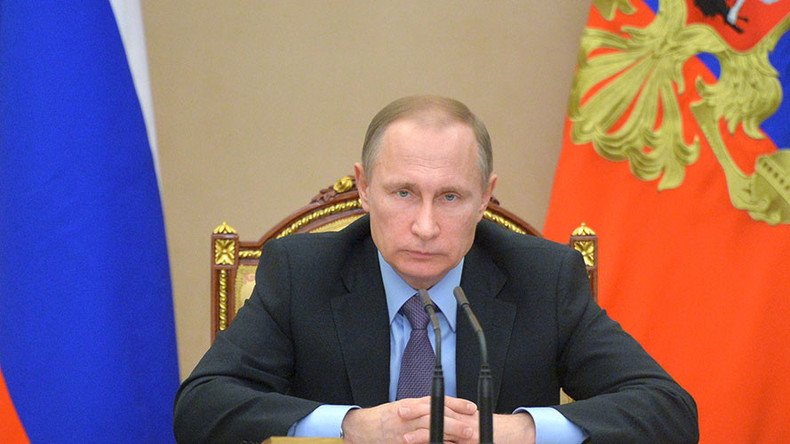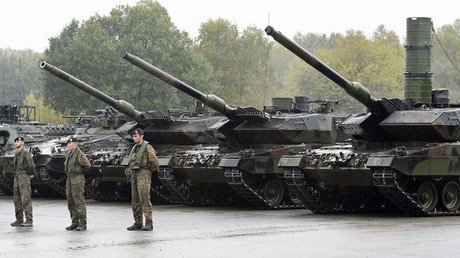US defense establishment believes Putin must be 'defeated'

Certain people in America’s defense establishment believe that only governments that do Washington's bidding are “truly legitimate.” Others have ideological reasons to stir up tensions with Russia. This fuels discord and creates an unstable world.
Imagine if a major Russian media outlet carried an article with the headline, “How We Can Defeat Obama.” It’s pretty certain that within minutes various pro-NATO analysts would be all over Twitter labeling it as “hybrid warfare,"“Russian aggression” or even, heaven forbid, "hot war." Or whatever this month’s agreed catchphrase is.
Let’s take it a step further. Ponder what would happen if the same pundits then realized the author was a recently redundant Russian Defense Department official. Without any doubt, the concern-o-meter would reach the stratosphere. Soon, the topic would be trending on Neocon Twitter. Neocon Twitter, by the way, is different than normal Twitter. In this version, all dissenting voices are blocked.
Last week, Newsweek published Evelyn Farkas, the former US Deputy Assistant Secretary of Defense for Russia/Ukraine/Eurasia (who vacated the post only last October). In her incredibly aggressive op-ed, Farkas explained “How We Can Defeat Putin.” The same Putin who is the popularly elected President of Russia. The world’s second strongest military power.
Farkas is now an employee of the pro-NATO Atlantic Council, which the formerly venerable Newsweek appears to have partnered with. The Atlantic Council is funded by the US State Department, the US Army, the US Air Force, the UAE & Bahraini governments and various other vested interests. None of them are particularly supportive of Russia. On the other hand, most would directly benefit from increased NATO spending.
Throwing Money At NATO
How does Farkas propose “defeating” Putin? By spending more money on NATO, of course. Also, she suggests sending more weapons to Ukraine, Georgia and Moldova. Of course, it was American meddling in the first two that created the current tensions. The latter country is currently enduring a political crisis and mass protests. This is ignored in the western media, because the corrupt incumbent regime is pro-Washington.
Farkas suggests arming the Syrian opposition, the loose coalition that includes the Al-Nusra front, which is part of Al Qaeda, the same folks who attacked New York on September 11, 2001. Not to mention, that such a course of action would destroy the nascent ceasefire in that unfortunate country.
Reading between the lines, Farkas is essentially suggesting that Washington use Ukraine, Moldova, Georgia (and anti-Assad forces in Syria) as pawns against Russia. With no concern for the economic wellbeing, or safety, of the people who live in those countries (or those in Russia). The complicated ethnic situation in those regions also seems to be irrelevant. The only priority is 'American interests.' Which are sacrosanct.
BREAKING: #Pentagon wants $582bn in funding as part of fiscal year 2017 budget https://t.co/65t2IIo26zpic.twitter.com/97tAs9lSA8
— RT America (@RT_America) February 2, 2016
The fact that Farkas is the daughter of a Soviet-era Hungarian dissident is very relevant here. Charles Farkas fled Budapest, for America, following the abortive 1956 uprising. That embryonic freedom movement was brutally oppressed by Nikita Khrushchev’s USSR. Thus, it’s understandable that Evelyn has an axe to grind with Russia, even if many of its current leaders weren’t even born at that time.
Indeed, it seems almost certain that Farkas’ rhetoric projects her own deeply embedded distrust of Russia. Naturally, that hasn’t harmed her career. Hawkish anti-Russian views are attractive to the US military industry, which requires a tangible enemy to maintain funding levels. A glance at her biography shows a meteoric rise, which includes top positions at NATO.
The Big Prize
However, Farkas’s perspective outlines all that’s wrong with how the US interacts with the rest of the world today. She’s calling for the defeat of a leader with 80 percent approval ratings, because he doesn’t support US foreign policy objectives. If Putin prevents America taking over the world, he must be removed. It’s Doctor Evil stuff.
This fanatical analyst believes that Russia is a threat to America. However, it’s NATO which has been expanding during the past two decades, while Moscow has taken a defensive, often highly reactionary posture. For example, in Syria, Assad’s forces had the upper hand in Aleppo and would surely have taken the city, but Putin agreed a ceasefire rather than continue the bloodshed there. A real-life expansionist warmonger would have kept the fighting going.
In reality, it’s America which has been aggressive in this century. Illegally invading Iraq, destroying Libya, facilitating the collapse of Yemen and the Syrian Civil War. In Russia’s backyard, Washington has openly fomented uprisings in Georgia and Ukraine, the results of which have subsequently been rejected at the ballot box. The US-backed regimes in Kiev and Tbilisi were both eventually voted out after the “Orange” and “Rose” revolutions. The current ‘Maidan’ administration in Kiev now has lower approval ratings than the democratically elected, if corrupt, government it replaced.
This indicates that they were never popular upheavals to begin with, but rather driven by capital city liberals, without mass backing in the provinces.
The Washington elite believes that it can dictate to Russians about how they should be governed. They also present fringe opposition figures, like Mikhail Khodorkovsky or Garry Kasparov, as realistic alternatives to Putin. In the real world, serious Russia experts know that these characters have almost no support inside the country.
Russia After Putin?
As it happens, should Putin be removed as President, or voluntarily resign, it’s much more likely that his successor would be far more hardline in their attitude to the West. By Russian standards, Putin is a moderate. The vast majority of Russians are far less tolerant of America’s behavior than their President.
Another Neocon obsession is with NATO expansion. Their argument is that countries wish to join the alliance and that it’s not Russia’s business. That fails to take into account how poor these states are. The likes of Montenegro and Albania can choose to use their own meager resources to maintain a military or (https://www.nationalpriorities.org/campaigns/us-military-spending-vs-world/) have their defense spending largely looked after by America. The same America that spends as much on its army as the next nine countries combined.
With NATO, comes money. Lots of it. Dollars are attractive to impoverished nations. Doubtless, if Russia could match US largesse, the situation would probably be very different. Thus, America buys loyalty and these nations become little more than US military bases in Washington's eyes.
The problem with Farkas’ Newsweek diatribe, and other similarly bellicose American discourse, is how downright dangerous it is. These people believe that any leadership, no matter how popular at home, with an agenda contrary to Washington is invalid and must be removed or defeated. They don’t acknowledge the absurdity that if Russia followed the same logic, there would be an apocalypse. This is because they believe that only the US is allowed to have - and pursue - ‘interests.’
A certain cabal in Washington thinks that only America, and countries that do its bidding are “truly legitimate.” They can only countenance the US agenda, at the expense of all others. This is a recipe for disaster.
The statements, views and opinions expressed in this column are solely those of the author and do not necessarily represent those of RT.















